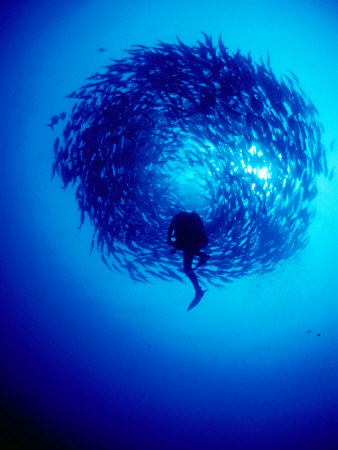 According to Andrew Sullivan, Alexis Madrigal claims that flocking behaviour is “… a beautiful phenomenon to behold. And neither biologists nor anyone else can yet explain how starlings seem to process information and act on it so quickly.”
According to Andrew Sullivan, Alexis Madrigal claims that flocking behaviour is “… a beautiful phenomenon to behold. And neither biologists nor anyone else can yet explain how starlings seem to process information and act on it so quickly.”
That second sentence is just false, as even a quick visit to wikipedia is sufficient to discover: Current research shows that this vastly complex behaviour requires no interaction between all points, and no orchestration by some unseen hand.
Flocking behaviour can be simulated in computers by creating groups of simple bots, each of which responds independently to three simple rules:
1) Separation – avoid crowding neighbors (short range repulsion)
2) Alignment – steer towards average heading of neighbors
3) Cohesion – steer towards average position of neighbors (long range attraction)
Some researchers have even gone so far as to create real, flying drones that exhibit this behaviour.
The miracle is not that this grand ballet is so complex, but that it’s so damn simple in its essence.
Look, I marvel just as much as the next person when watching vast flocks of starlings. And there are few things more graceful and poignant than an entire school of sardines arcing over the waves in consecutive leaps as they flee from predators. There is little in life so exhilarating as being engulfed in a pocket of azure space as a school of reef fish flow soundlessly around you.
These are all examples of of simple creatures following simple rules, collectively iterating and permuting in patterns whose complexity the human mind finds attractive, even enthralling. Because it cannot follow the linear progression of individual acts in such a vastly parallel pattern, the brain hits the overload switch, which results in our sense of wonder.
It is, almost literally, mind candy. But that does NOT make it a mystery.
I’m not asking that we put aside our wonder, but can we please accept that many of these so-called mysteries are NOT mysterious. (Well, not any longer, anyway.) I’m as big a fan of exaltation as the next person, but I cringe when we allow it to curb our perceptions and our ability to learn.
